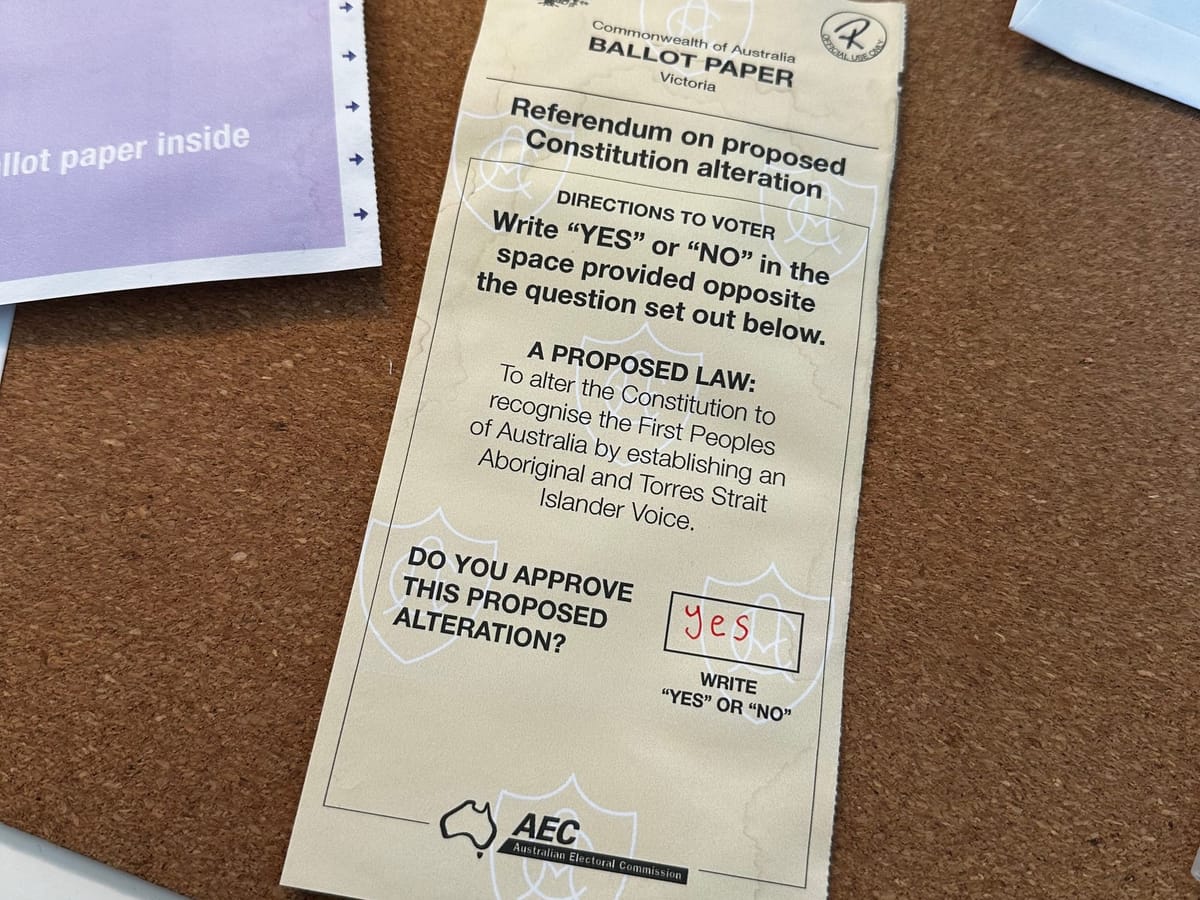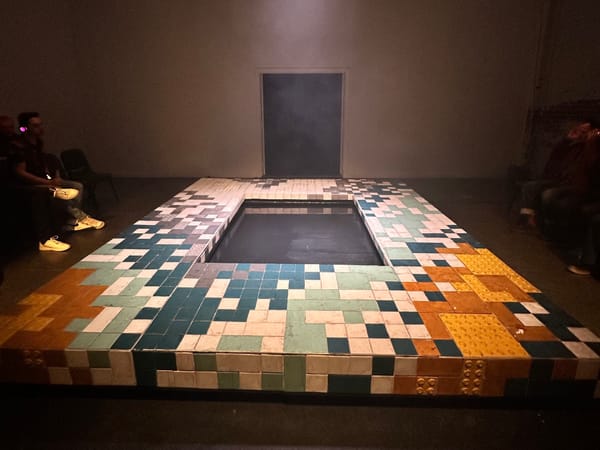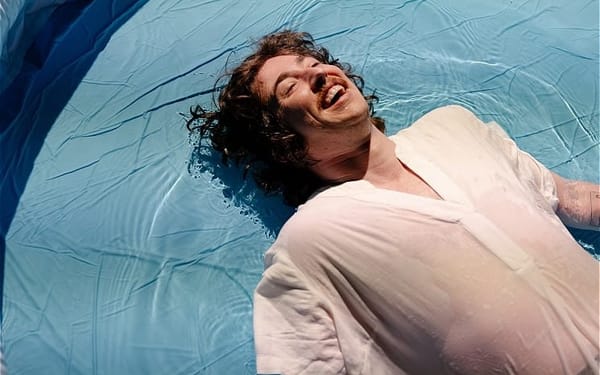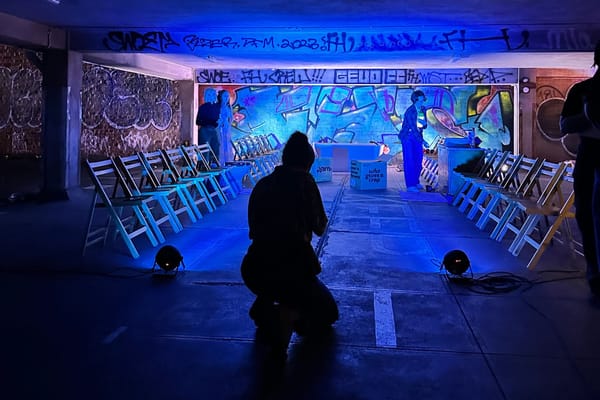We get to decide how we live through it
Reviewing ‘Democracy Repair Services’ by Noemie Huttner-Koros, directed by Martha Latham, presented at Melbourne Fringe in 2025

This is a review of Democracy Repair Services which was presented at Melbourne Fringe a couple weeks back.
The show was written by Noemie Huttner-Koros and directed by Martha Latham, a critic/director who’s writing I really f*ck with (and who also wrote about my Melbourne Fringe show). When emailing me about reviewing she said:
Per Instagram post feel free to have a lot of fun with it!
Make the review a poem or just a collection of memes the play made you think about!
Also we're all pretty tough skinned and want to know your opinion for real so won't be hurt by honest and constructive feedback! Please don't be concerned you will damage a relationship or anything else!
I don't know if you've ever read my writing but I like it pretty kooky!
So here goes a little experiment. I hope you like it, even if it is a bit long. And to Martha, I hope it’s kooky enough for you. x
I really really really don’t want to be an activist.
I think I first said something of that sort that while sobbing in a Zoom class to my lecturer, Fleur Kilpatrick. In 2020, my university, Monash, put through a series of redundancies because of the government’s refusal to provide higher education with Jobkeeper, that COVID-era welfare payment which kept everyone ‘employed.’
Based on consultation with the union, a set number of redundancies were decided per faculty, but it was up to the bureaucracy of the uni to decide where in each faculty those redundancies would take place. I’m sure I’m remembering these numbers wrong, but within the Arts faculty there were about six jobs to go. Four of which, the then Dean of Arts decided, would go to the Centre for Theatre and Performance: my school, and really my first home in Narrm. For a school of about six staff what was really being offered was the total disestablishment of the CTP—the whole reason I had moved to Melbourne.
I won’t go into the details of the campaign to save the CTP and the coverage we received (I archived a lot of what happened here). All you need to know is that I was devastated—the saddest and angriest I’d ever been in my life—and confined to a house a kilometre away from the uni I wasn’t allowed to visit (but could see from our upstairs window).
I used to go on those time-limited lockdown walks and blast 100 gecs into my skull. The opening lyrics from money machine would come to define for me how I felt at the time: “Hey, you little piss baby, You think you're so f*cking cool? Huh? You think you're so f*cking tough?…” I imagined I was yelling those lyrics at the Dean and it made me feel some sort of catharsis before I got home and invariably started crying again.
Democracy Repair Services is a play. It’s about a group of four young people figuring out how the f*ck we live through the climate crisis and where democracy fits into it. They make up a sort of affinity group to take direct action against fossil fuel infrastructure in some regional town on this continent. Admirable stuff.
Aside from you know, blowing up pipelines, they try to figure out how to work together, what consensus based decision making looks like in practice (it's sooo messy), and how to be together without emulating all the f*cked-up-nothingness of regular democracy. How do you trust the people you're working with to change things if you're not all in it for the same reasons? What does it take to make change rather than headlines? If democracy produces leaders who walk us off the cliff, is it even an ideal worth striving for?
It's an amalgam of all the anxieties and fears and secret thoughts I‘ve had when thinking about how/if we can fix things. There's delicious asides to the audience where these young people stumble through the thinking of it all and it feels so messy and lyrical and hopeful. Not in the sense that this might change things, but just that it reminds me that I'm not alone in knowing these are all the things that are gonna have to change. And there’s an overwhelming lot of them.
A central motif in this play are the Bogong moths, a brown species of moth which spends summers migrating from around the south of the continent to the Alps to basically hibernate. While in the past these fat f*cks used to migrate in massive plumes of moth (occasionally getting caught in Parliament House in Canberra, the show tells us), they've seen their numbers massively plummet since the late 2010s. It's f*cked up and entirely emblematic of Australia's relationship to country, so playwright Noemie Huttner-Koros runs with it as a metaphor for how we should aim to be: massive unstoppable plumes of moth here to f*ck sh*t up.
The play breaks apart halfway through and it becomes this moth bonanza. Moths are everywhere and it's overwhelming and a lot and also stunning.
I love a play with a solid design vision, and this one delivered. There's giant moth masks, literal buckets of moths dumped on stage, and stolen construction equipment framing the entire space as if to say: work in progress.
(If my central point in this review was that this show wasn't ready for the stage, that would be a brilliant way to get to it. But that's not my point lol.)
There's a bicycle micced up to a sound desk which, when it spins, sounds like a swarm of moths. There's delightfully analog scene titles projected onto the side of the space which were kind of illegible but maybe it was ADHD and I just wasn’t paying attention when I was meant to. I'm willing to forgive all that clunkiness and blame it on the venue; putting on a show that is designed well in a fringe festival is f*cking hard but these folks did an awfully good job at it.
Also, the pre-show playlist had 100 gecs’ money machine in it and it made me smile. They get it.
I love a good climate change play.
I think there is something about ecological destruction and unchecked capitalism that makes the theatre which grapples with it so much more alive and potent, even when it fails (which, often, it does). Maybe it’s the wide-reaching-ness of the crisis? The fact that we’re all in it together? The unknowingness of it all? Unsure.
These are the moments that stand out to me when I think about climate change theatre:
- There was a moment right towards the end of Sarah Aiken and Rebecca Jensen‘s What Am I Supposed To Do? (WAISTD) where the audience — having spent half an hour in a rhythmic choreography on the stage of the Fairfax Studio involving office chairs, skulls, and branches with leaves still on them — is invited/prompted/finds it in ourselves to push this giant massive black bean bag (like five people could’ve fit inside it massive) up over the seats and out into the foyer. For the first time in a fairly placid bit of participatory theatre we were working as a group without guidance. There was something about that transformation into beings with agency that felt really powerful, a reminder that (cliche, I know) we can do something if we do it together.
- Then there’s David Finnigan’s Scenes from the Climate Era which begins the show basically asking the audience to scratch any SUV they see after leaving the theatre, and ends deep in the future once everything’s gone to sh*t and come right back around again. We hear the waves and in one massive moment of pathos the entire stage is covered in falling sand as the earth settles again, irrevocably changed from the anthropocene.
- I have to mention Fleur Kilpatrick’s Whale too. This was a participatory play about islands sinking into the pacific, where one (un?)lucky audience member plays the sunken island (who gets to meet and have a conversation with a whale on the bottom of the ocean). One of the most sickening(?) parts of that show was that we had to vote for which island would sink. There was one island with a city, one with a small population of folks who live sustainably with the land, and one with an endemic penguin population. I saw this twice, and never saw the penguins get voted to sink. I think that says something.
Then there’s so many others that were magic too, Moira Finucane’s The Rapture, A2 Company’s Running into the Sun, Terrapin’s Goldfish, The People’s Peacemongers, David Finnigan’s other big show Kill Climate Deniers, and Patrick Livesy’s I Hope This Means Something.
When I was younger I used to watch a lot of this art and complain that it didn't do anything. And to an extent I still feel that: depicting an issue doesn't do much to change an issue. There's a juvenile justification that some artists use, saying their work 'brings awareness' to the issues but... awareness very rarely translates into doing.
Do artists deserve to feel good about having said something, especially if awareness isn’t enough? What‘s the point of ‘raising awareness’ when the world is literally dying and we’ve known about it for decades?
Aside: I love love love this bit of writing from David Finnigan about where he thinks climate art is going in the next decade.
So why do we stage theatre about climate change (and all the other Big Issues)? What's the point of activist art when really we should all be out there blowing up pipelines? Did Democracy convince me to go and destroy fossil fuel infrastructure or join XR or glue myself to that sh*tty Picasso in the NGV?
I'll get back to that, but for now I wanna quote the director, Martha Latham, in her review of my fringe show, where she talks about directing her fringe show, Democracy:
I think I did everything mostly right. Everyone had a good time, felt safe, and the play was really strong considering the facts.
I think Democracy is a play about figuring out how to change things, and the messy uncertainty of that. Part of changing things is about figuring out how to work with the people who you want to change things with and for.
Part of the exciting bits is that we get to decide how we do it.
There's the administrative questions of: How do we keep track of what we need to do? What's our shared calendar look like? Where are we storing files? (For me, the answer to all of these is Basecamp which is simply my favourite project management software ever, please ask me to info dump about Basecamp).
There's bigger questions too like: How do we resolve conflicts? Who do we speak to when we feel unsafe? What do I do when I don't want to do this project anymore? (Liv Satchell once told me that she structures all her projects such that if anyone at any point doesn't want to do the show, they can pull the plug and make sure everyone still gets paid. I think this is brilliant and beautiful and difficult but an excellent way of making sure we can make theatre with joy.)
And all the bigger questions too: What do we do? Why here, why now? Who are we doing it with? (Grant-app-core).
What I'm saying now is, and what I think Martha and Noemie (can I use first names in this review? Noemie sent me a copy of the script so I think we're friends now) are saying is this (stolen from the script):
We get to decide how we live through it.
And whether or not Democracy worked as a piece of art (which it mostly did), I think it sounds like it worked as a model of people coming together to make something different. I know reviewers don't normally review the internal processes of a show, but Martha sent me the Google Drive to see how the sausage gets made and I'm glad to see there's no horse meat in this one.
Martha and Noemie made a show with care and generosity and rigor and I'm here to say that, actually, that matters. The way we make is just as important as what we make, and I'm happy to see in this show something made well.
Some theatre-makers go to NIDA (Martha) or WAAPA (Noemie) or VCA and they learn how to make good theatre (I assume that’s the case because they made some good theatre).
But I went to Monash and I learnt some other things. I got to see first hand how little this country and its institutions care about art. I learnt how cold bureaucracy can feel when it tries its best to shut you up.
I learnt how to organise a group of my friends and figure out how to save your school. I learnt how to tell Socialist Alternative to f*ck off. I learnt how to pester an organization's social media accounts to the point they write an internal 76 page dossier documenting everything you're saying publicly about them. I learnt how to run a vote of no confidence and I learnt how to talk to journalists and how to speak on TV and how to rally a community and make a website and put up with your annoying comrades because actually you're all in it together.
Worst of all I learnt how it feels to lose. I learnt how it feels to see the individual who made the decision to close your school be promoted to Vice-Chancellor two years later. I learnt how quickly the bureaucracy closes over the wound. I learnt what it would feel like to be one of the last people to graduate with a theatre degree from Monash. I learnt that you can ask your uni to re-print your degree if they forget to include your no-longer-offered major.
I learnt how to be an activist, even if I really really really didn't want to be one.
At the time Fleur, or maybe Stuart Grant said that 'this is the best theatre education you could ever receive.' It was frustratingly true but at the time I really didn't wanna hear it.
This is the thing:
We get to decide how we live through it.
I just love everything about the way that sentiment is phrased. I wrote it down the second the curtain call began it just hit me as soon as I heard it. Something about the earnest expression of gratitude that we have all the agency in the world is so !!! to me. I’m keeping this phrase close to my heart and I just know I’m going to be saying it for decades. We get to decide.
So how are we gonna live through it?
This is how I want to describe Democracy Repair Services: It's a show which failed upwards.
I think, what I mean by that, is that it hasn't saved the world. It hasn't fixed democracy. It might not even necessarily have inspired anyone to blow up a pipeline. It had its moments of clunkiness and the night I saw it had some sort of sound mishap (opening night, it's fringe, whatever).
It had a lot going for it too. And like me and my friends earnest attempt to save the CTP at Monash, it failed. But I think a lot of people learnt a lot of good things and had a good time doing it. I learnt how unoriginal my experiences of figuring out how to do activism together are. I learnt about Bogong moths getting stuck in Parliament House. I learnt how un-alone I am in all these f*cked up scary thoughts.
It made a little bit of the world better in the way that it was made and it made me feel a little less alone watching it. That counts.
I don't even know if the fantasy that Democracy ends up at, that we all rise up and fix it all, is even possible. But did seeing that fantasy happen on stage help me believe it could become so a little bit more? Maybe. Did the process of rehearsing that fantasy convince the cast and crew? I'd like to think so, and I'd like to think that that really matters too.
Ultimately I voted yes, but overwhelmingly the country voted no. I don’t know what to make of it.
The night the results came in my old housemate from Chadstone, a white woman, posted a selfie of herself in tears to her Insta story. The caption said something about how she thought Australia was ‘better than that.’ A couple months later I removed her from all my socials because she was sharing Zionist propaganda. So it goes.
Earlier today I read this essay from The Gauntlet, a newsletter about COVID, which describes what it's like continuing to be COVID-conscious while the rest of the world's moved on. (Emphasis added)
But what else is it? Living on the other side of the portal? You’re now outside of “normal” entirely. You’ve been cut out of “society” which comes with many negatives- but maybe a few positives? Your friends are COVID safe people, many of them disabled. You cannot participate in social events where people ignore disability justice. You’ve had to build a parallel world, this new, tiny little world through the portal. Freeing. New. Stripped down. Real. Lacking artifice. Lacking distraction.
I think part of what I love about theatre, especially activist theatre, is that in order to make it you have to create the world in which your story exists.
For example, to make Full Cream I had to spend two years rebuilding my relationship with my body to love it because—and not in spite of—its fatness. Only then could I make a show about fat kinship and love.
When I did a uni production of Kill Climate Deniers we had to teach ourselves about climate activism, about the way the planet is dying and we're failing to stop it, and all the ways we can fix it. We had to become the activists the story needed us to be.
The final line from Noemie's script:
In case of emergency, sow the seeds.
So maybe Democracy isn't a failure after all. Maybe it's a brilliant beginning to an exciting affinity group who's gonna single-handedly end fossil fuel extraction on this continent or fix theatre for good. Maybe it's a beautiful little moment where we all got to believe that might happen. Maybe believing that will make it so.
I think the most disheartening thing about democracy these days is how everything is so calculated, and middling, and managerialised and focus grouped and sterile.
Of course the Greens lost seats, those f*ckers couldn't even bring themselves to campaign loudly on for Palestinian liberation. Instead we got depressing promises like 'no new oil & gas'.
As I write this it looks like Zohran Mamdani's about to win the race to be the next mayor of New York, and watching his campaign has made me feel really optimistic again.
Dare I say… it feels different this time. The way he says the things we all want and believe in. It's bold and radical but in a way that makes me think this should (and could) be bog standard. This should be every election.
I hope he wins. And I hope he changes things. And I hope things get better.
And I hope that democracy wasn't a failure after all.
Hope you enjoyed! Not my usual writing so I would love to hear what you think either via reply or comment or DM or a yap in a foyer.





